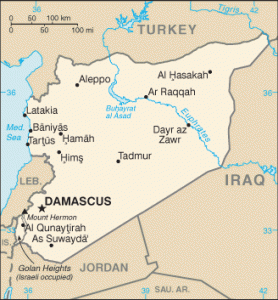An activist movement in Syria is calling for an end to the armed conflict, particularly calling for opposition forces to lay down their arms recommit to peaceful protesting.
 The conflict in Syria began with mostly peaceful protests, but were met with attacks by the government of Bashar al-Assad. Once the opposition began to arm themselves, the conflict descended into an intractable civil war with deep sectarian undercurrents and exponentially higher casualty rates.
The conflict in Syria began with mostly peaceful protests, but were met with attacks by the government of Bashar al-Assad. Once the opposition began to arm themselves, the conflict descended into an intractable civil war with deep sectarian undercurrents and exponentially higher casualty rates.
Last month, Rima Dali – an activist in the “Stop the killing” movement – spent 33 days in jail for demonstrating outside Syria’s parliament with a banner that said “Stop the killing, we want to build a homeland for all Syrians.”
“People say the regime and the inaction of the international community left us with no choice, but I still think we would have been more effective if it had remained peaceful,” another activist told the Associated Press.
Many factions within the armed opposition are refusing to lay down arms and explicitly vying for an international intervention – which would almost undoubtedly be led by the United States if it were to happen – aimed at toppling the Assad regime.
While the Obama administration believes the UN-brokered cease-fire has failed and is reportedly exploring post-Assad scenarios, it has emphasized that no military intervention is currently being planned. Such an intervention is widely recognized to likely escalate the violence and be to the long-term detriment of the Syrian people, although many in Washington have ignored those reasoned objections to intervention.
The UN peace plan brokered by envoy Kofi Annan has not stopped violence, but Annan claims it is “on track” and that the conflict was “not going to be resolved in a day or a week.” The movement to demilitarize the opposition movement is still small, but the increasingly widespread sense of a stalemate may tip the balance in the near future.


